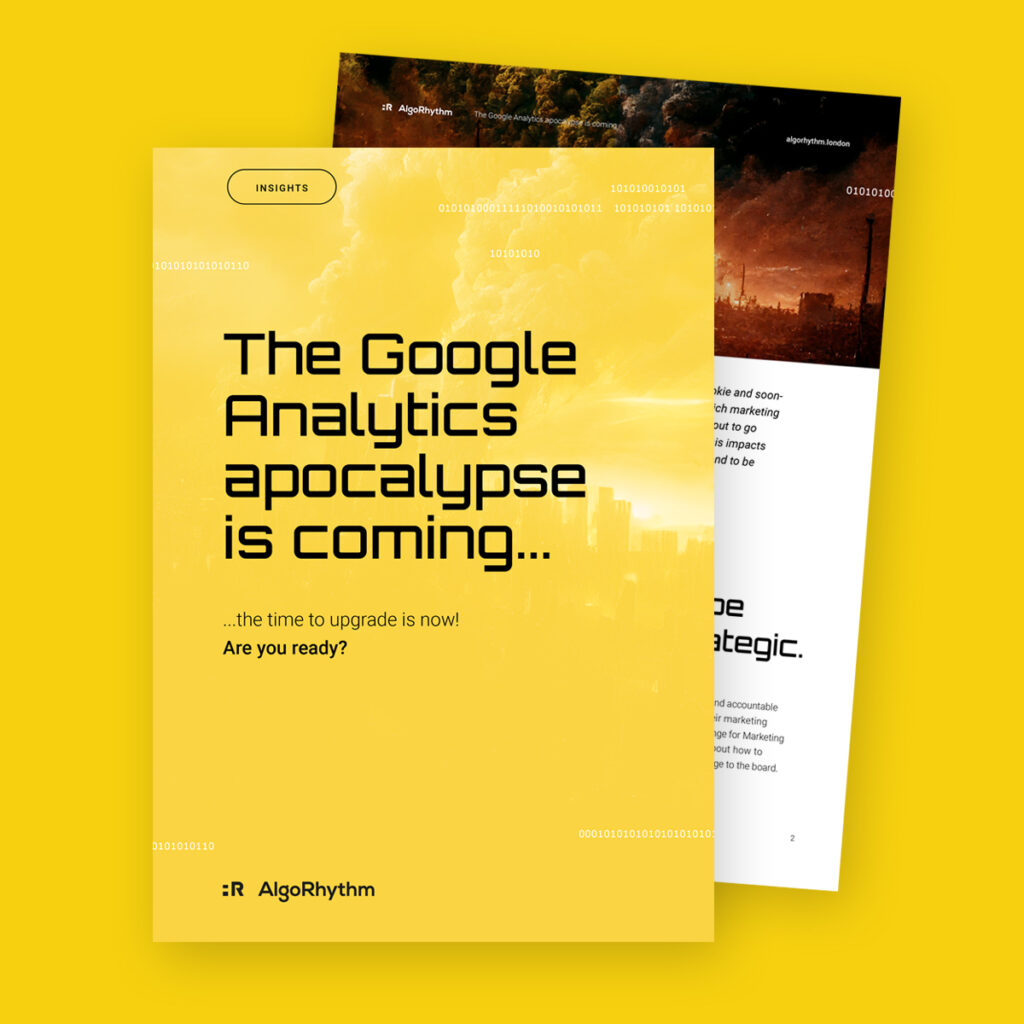Category: Rant
Google Analytics Banned in Europe – the general consensus is ‘meh’.

We recently ran a content piece with the click bait title, ‘The Google Analytics Apocalypse is coming…’ This was primarily in response to GA as we know it, being officially sunset by Google this summer. Some of our clients have already made the switch to GA4 so we were already pretty familiar with the new layout but it has to be said, we’d always groan when we found they were on GA4, missing the familiarity and much easier navigation around it’s doomed sibling.
We’d already planned the piece and were ready to push it live, when we saw the muted, rather casual press that GA had effectively been banned in France and Austria and the Netherlands, Denmark, Norway and Italy were likely to follow. Excuse me, what now? How had that slid under the radar and why weren’t discussion forums, and LinkedIn for that matter flooded with concerned digital marketers?
At a conference recently, one of the [excellent] speakers mentioned GA’s European ban, spurring a lot of confused and slightly nervous looks from its audience of predominantly agency founders. The chap sitting next to me said, “GA4 fixes that though doesn’t it?”
“I don’t think so,” I replied – seems to be the way Google is sharing data into the US that creates the GDPR issue, so unless they change that for GA4, it doesn’t matter which version you are using.
So what actually happened?
A real life David and Goliath scenario, where lawyer, Max Schrems took on Facebook and then Google, for violating the privacy of European citizens – and beat them both in landmark court rulings.
The issue was exacerbated by silicon valley tech companies, basically ignoring the ruling that the privacy shield legislation had been invalidated, meaning they were not allowed to transfer data about European citizens to the US.
Max’s claim against Google, was concerning data captured by an Austrian health website. The fines have still not been issued but could be as high as 20 million euros or 4% of their turnover. That’s not a fine for Google… that’s the actual client collecting the data, i.e. that could be one of our customers or it could be you!
The issue is around the American CLOUD Act, which means US authorities, like the FBI, are entitled to demand personal data from the likes of Google and Facebook even for individuals living outside of the US. This breaches GDPR legislation. It is theoretically possible, Max argued, for him to be identified personally, using the subsets of data collected about him on the website and then passed by Google to US servers… bringing it into the grasp of US authorities. It didn’t matter whether they used it or not.
What do we need to do?
Well, it’s tricky. This isn’t just about US tech companies with European operations, if you are an organisation in Europe, and you have European citizens accessing your website, whether or not it’s an intentional target market, if you are using GA or GA4, Google is inadvertently breaching GDPR on your behalf and you get to pick up the fine!
There isn’t clear guidance, although some brands are already implementing technical measures, effectively passing their data through their own servers based in Europe, which anonymises data, or, and here’s a term for you for your next boardroom bingo session – ‘Pseudonymisation’.
I think the answer will come from our clients’ privacy and cookie pop-ups, i.e. when we ask users to opt in for marketing cookies etc. If a user is in one the of territories who have effectively banned GA, it will automatically turn the slider off for GA and they will no longer appear in your metrics.
Anonymous or incognito users will simply be ignored in GA tracking. Worst case, if you try and access a website from the parts of Europe putting their foot down, client websites will simply have to show a, ‘Sorry, we are not authorised to allow access to citizens based in X’ – but that seems crazy doesn’t it?
Will publishers switch from GA? Well the alternative platforms certainly hope so, and are drooling already. Just Google, ‘alternatives to GA’ and see what is happening.
Back to GA4 and the sunsetting of GA… which may simply be the harbinger of the apocalypse!
A lot of the ‘meh’s, are now becoming questions in forums or pleas for help. I’m seeing a lot of, ‘How do I set up tracking in GA4?’ and ‘How do I view organic keywords in GA4’ and ‘How do I ignore employee and agency visits in our metrics in GA4’ or simply, ‘What the hell, where has everything gone!?!’ One thing, which seems doomed, is assisted conversions data and true paths to conversion as Google is only really interested in last click attribution, as it wins that war hands down!
If you want to download our guide, click here or on the image below.

How dare Malcolm Gladwell have an opinion on working from home

There’s been a couple of interesting ‘moments’ on LinkedIn for me lately, and in a way, I am delighted as LinkedIn has become a bit of an InMail nightmare for me – mostly folk selling me growth hacking, leads for my agency or worst of all… life insurance. Jeez, really? The only thing that keeps me on LinkedIn apart from running campaigns for our clients of course, is keeping up to speed with what my network are up to and the great content that they put out. But it is becoming less appealing. I absolutely reach out to people using InMails, especially when I am in the middle of a funding round, but it’s usually well researched and I make the effort to make my message as interesting as I can and relevant.
Anyway, the two moments. First and not really the topic of this post, is the crying CEO who posted an image of his tear streaked face, along with an emotional update on how, for the first time, he had to make some of his team redundant. Now, could be genuine, but seemed to me like someone making everything about themselves – poor me, had to fire some folk, but I’m such a good guy, look how it hurts me! The backlash was surprising – a stream of spoof posts, of crying individuals bemoaning their first world problems. My personal favourite, was the chap deeply emotional that he had missed the McMuffin deadline by five minutes and had to have a Big Mac for breakfast.

There was then a backlash on the backlash, as many LinkedIn members felt it was making light of what could be genuine mental health issues and as a community, we should be showing some empathy and compassion for those effected… if not the CEO with leaky tear ducts.

The second big moment, was Malcolm Gladwell’s chat with Steven Bartlett on The Diary Of A CEO podcast. Now, Steven is an incredible marketer, and it’s one of the reasons why he’s been so successful (not the only reason for sure) and he knew exactly what he was doing when he titled the episode, ‘Malcolm Gladwell: Working From Home Is Destroying Us!’ Steven knew what would happen when he threw this incendiary device of a title, into social media.
What surprised me, was the level of vitriol directed at Gladwell. There was definitely a healthy debate too, people could see the pros and cons of office working and working from home, we all have an opinion. But that’s the point, it’s subjective and we all prefer what works for us personally. It was the privileged view of some senior leaders who were aggressive in their attack that surprised me the most – it’s fine that you enjoy working from your plush home office, and only popping into Soho House to meet with clients when you need to.
But imagine you are in a small London flat, or house sharing. Imagine you are more junior in your role, it could be your first job. Imagine you aren’t from the UK and you are here working your ass off and you don’t have a social circle yet. What if you want to shadow someone with more experience and learn on the job… a task list and a screen is a pretty poor experience. And Zoom just doesn’t cut it.
I wonder if a lot of folk who reacted to the headline, even bothered to listen to the whole podcast? There was some incredible stuff on there about loss, about how neglect is the worst thing we can do to another human being (or animal for that matter) how contribution can drive happiness. And this is where Malcolm gets most animated and why he believes working from home isn’t great for company culture. We leave people out on the fringes, feeling neglected, they don’t feel part of something.
The really interesting thing for me, is that nobody called out or attacked Steven Bartlett for not only agreeing with Malcolm, but going on to say that he is thinking about making working from the offices of his own businesses compulsory and that he is asking employees and potential employees, where do you want to work? And if it’s at home, it probably won’t be for one of his enterprises. Controversial no? I don’t think so actually, it’s a brand choice and then the employees’ choice and as long as everyone knows where they stand, everyone is happy.
Personally, I believe that our job as employers, is to provide choice. If it doesn’t impact the output, mental health and culture, and you can make it work with parameters, let people work where they want. But I loaaaaaattttthhhh working from home. It’s my preference but I tell you what, since the pandemic and since we have become flexible, I am working from home 2-3 days per week and every time, it’s because I have an excuse NOT to face the commute, its too hot, I want to get a workout in mid morning, I have early morning calls and so on and so on. Usually though, it’s because I know the office will be empty. I crave social interaction, I love it, it’s the best part of working for an agency for me.
So, if a 5 x New York Times bestselling author, historian and anthropologist suggests there is a potential psychological impact of working from home, especially on younger and inexperienced colleagues, we should probably consider it and start planning how to do it better. We should probably start considering what companies, agencies and brands we want to be leading and growing, what culture do we want to finesse? It definitely isn’t as simple as letting everyone work from home three days a week and buying an enterprise Zoom license.
Do I wish I could piss off to Bali and become a digital nomad offering growth hacking services? Perhaps if I was 25 years younger and maybe that’s the point, maybe that’s what Gen Z want and our job is to help work out the kinks but interestingly, it definitely isn’t what all Gen Y and Gen Z want… some do want an office culture. Viva La Difference I say.


